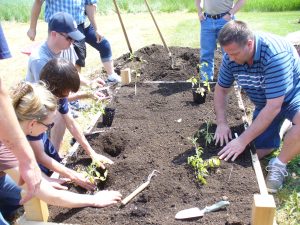Jillian Randel | April 1, 2011 | No Comments
Story by Jillian Randel
Imagine a community where people can respond to economic downturns and fluctuations and availability of food with confidence. This community would be independent and self-sufficient. Members would cultivate, sell and store all their food needs, leaving little to be bartered with the outside world. Imagine a highly functional and effective transition initiative.
What does a town of 65,000 people eat? Where does this food come from and where does it go? Those are the questions Bill Sharple addresses through his State College, Pennsylvania, transition initiative.
“I have established a project to develop an architecture for local economies,” said Sharple. “It’s a process of defining what a self-sufficient community looks like and developing a model for a local economy.”

Participants plant tomatoes in one of the Garden Starter projects in the State College transition initiative, designed for people who want to learn how to grow their own food organically. The focus is on small raised-bed gardens that can be set up almost anywhere. Photo courtesy of Bill Sharple
The Transition Network, started by a community in Totnes, U.K. in 2005, encourages communities to reduce energy consumption, moving away from nonrenewable and carbon-intense energy sources to build local economies and food dependence. The idea has spread like wildfire, inspiring the development of over 350 transition towns worldwide over the past six years.
The State College initiative formally came into existence last spring and has since hosted a series of workshops on local foods, permaculture, rising gas prices and open forums on topics such as food and energy.
The initiative is working with local churches to develop community gardens; they helped plant one garden last year and already have two new garden projects in the works. One church has an acre they use to supply the local food bank, and Community Supported Agriculture (CSA) projects are thriving throughout the town.
“We have a group from the School of Living [an organization dedicated to establishing environmentally-sound communities] beginning to look at an incubator model to help people start homesteads for farmers markets or for their own use,” said Sharple. “Incubators encourage economic business opportunities by providing space, training and resources to ‘hatch the eggs’ of businesses and bring them to life.”
Katherine Watt, one of the other founders of the initiative, is working to establish a permanent farmers market to have a building where people can assemble and meet. She also has a blog and monthly column in the local newspaper about sustainability.
“Our goal is to reach self-sufficiency and to get 10 percent of our food grown locally within 10 years,” said Sharple, who estimates that State College currently consumes about one to two percent locally grown food. “You have to find out what works best for you. The bottom line is we have to come up with a higher degree of local self-sufficiency, and we can do that and still live a good life.”
Transition towns have powerfully impacted communities worldwide. What began as one town’s desire to move away from nonrenewable sources of energy has transformed into an entire movement addressing global economic and environmental issues.
To follow the State College blog, visit voicesweb.org.
Other Initiatives In and Near Appalachia
Asheville, N.C.
transitionasheville.ning.com
Berea, Ky.
sustainableberea.org
Staunton/Augusta, Va.
transitionstaunton.org/about
Carrboro/Chapel Hill, N.C.
transitioncch.org
For more general information on transition towns, visit transitionnetwork.org
Like this content? Subscribe to The Voice email digests